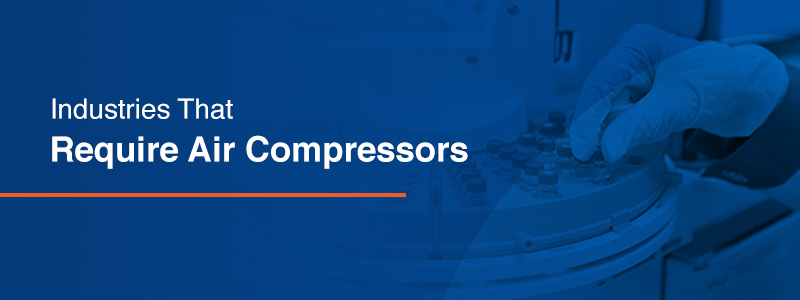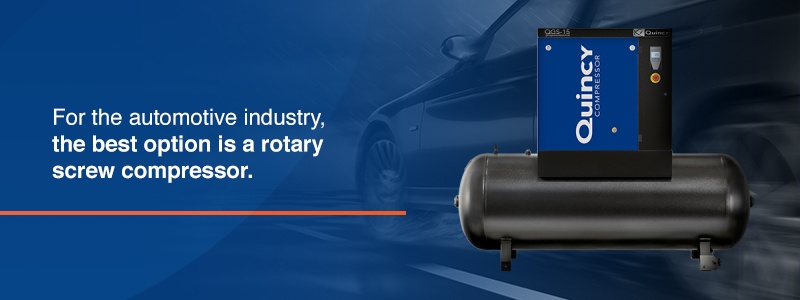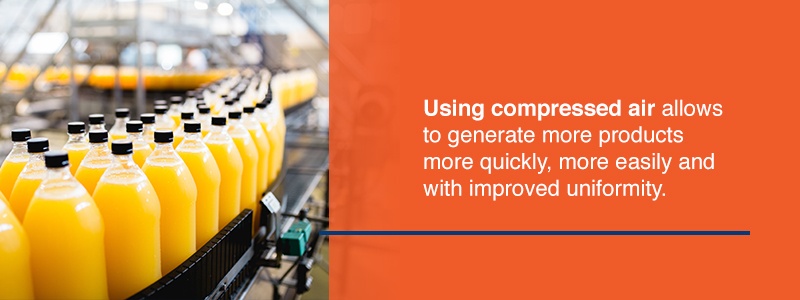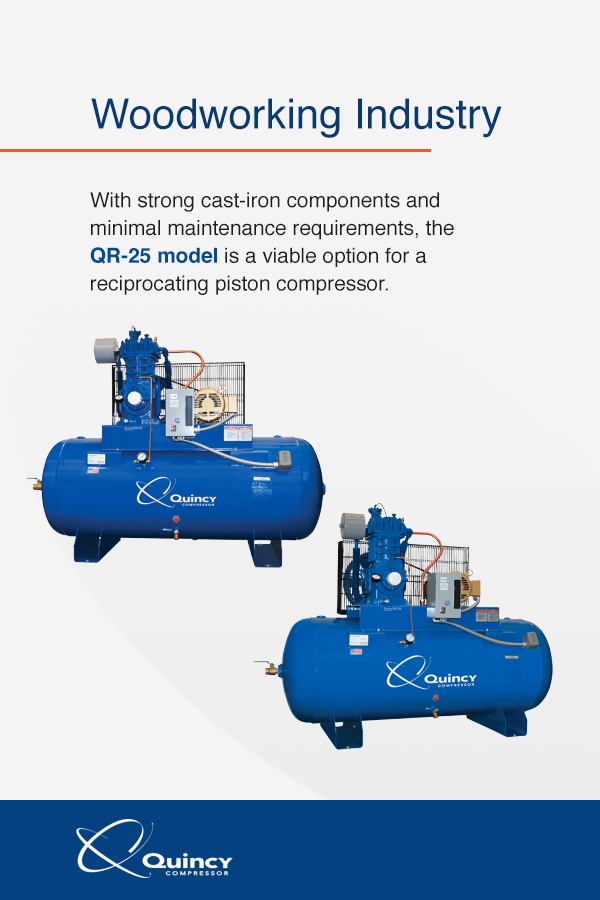
Professionals in dozens of industries have devised time- and labor-saving uses for compressed air. The applications of air compressors are nearly endless. The food on your table, the painkillers in your cabinet, the car you drive to work, the wooden chair you sit in — compressed air plays a role in their production in one way or another. We reap the benefits of compressed air constantly in our daily lives but think little about it.
Compressed air is an integral part of modern society. Air compressors are used for increasing productivity, precision and speed in a broad range of industries. It can strengthen power tools to make construction easier. It can portion ingredients with perfect, dependable accuracy, eliminating human error. It can increase the speed at which products move along assembly lines. Compressed air is an essential tool for both mass production and do-it-yourself projects.
How to Choose the Right Air Compressor for Your Industry
Top-of-the-line air compressors include features that satisfy the most demanding compressed air applications. Investing in quality systems and premium performance gives you access to features like air- or water-cooled engines, maximum energy-efficient units, quieter operation, high-efficiency rotors for longer life and industry-leading extended warranty protection programs.
While premium air compressor models go above and beyond, they can drastically drive up initial expenses. Even with their long-term savings, you might not need the additional features of a top-of-the-line model. Decide on the most essential features for you, and cut non-essential elements to save on upfront costs, ensuring the most efficient use of air compressors for your industry. Keep in mind that it’s best to assess your needs in the long term, as you may have to budget more to regularly service an air compressor when you could have paid more in upfront costs for a low maintenance option.
The Difference Between Single-Stage and Two-Stage Compressors
A two-stage compressor provides more efficient operation up to 200 pounds per square inch (psi). However, if your psi requirements are below 150, a single-stage system would be an appropriate option. Both designs work similarly, though the two-stage draws in the air a second time after it has been piped out and cooled after the first compression. The two-stage, therefore, delivers more power than a single-stage.
Understand Your Compressed Air Needs
An experienced professional will help you develop more accurate site-specific recommendations, but evaluating your needs on your own first will help streamline the process. A narrowed-down selection of the possible systems for your industry enables you to assess size and features to give yourself a general idea of the right compressors for your industrial applications. The operating pressure, measured in pounds per square inch gauge (psig), and the compressor capacity, measured in cubic feet per minute (CFM), are the numbers you want to figure out in order to equip yourself with the most appropriate system.
Answer the following questions to find the right solution to your air compression needs:
- What is the operating pressure needed for your facility? Operating pressure will help you determine if you need a single-stage or two-stage reciprocating design or a rotary screw compressor.
- What is the required CFM usage? You can find this out by checking the specifications for the CFM number of all the air tools that will be used simultaneously. Add a 30% buffer onto that number to account for future unknown or increased compressor usage.
- Do you need a portable unit, or can the compressor stay in one place? Some industries require more mobile solutions to ensure successful operation.
- What size is needed for the receiver tank? Size will be measured in gallons and can be determined by the type of usage. Short, concentrated bursts of air will require a smaller tank than that required by long usage periods.
What Industries Use Air Compressors?
Air compressor industrial uses change depending on each industry’s unique standards, requirements and varying levels of demand. Businesses in some industries require several connected air compressors, while companies in other sectors fare perfectly fine with a single compressor. Due to this variation, experts have fine-tuned air compressor technology to fit each industry best. Different air compressor models and accessories are best suited to various industries. Compressed air has become commonplace in much of modern production. Among the industries that use compressed air are:
- Automotive
- Pharmaceutical
- Railroad
- Food and beverage
- Agricultural
- Woodworking
- Manufacturing
- HVAC/climate control
- Dry cleaning
- Energy
- Plastics
Professionals in all these industries have streamlined processes, improved precision and reduced labor demands with compressed air, and each sector has unique applications for compressed air. As a result, industries tend to use specific models with various advantages. Discover the different compressors for industrial applications and model preferences per industry.
Automotive Industry
Air compressors come in handy along every step of automotive production — from assembly to painting to quality control. Compressed air in the automotive industry has made vehicle assembly and maintenance less physically demanding and less time-consuming. Tasks that would take hours now take only moments with an air compressor. As a result, automotive factories are more efficient and do-it-yourself vehicle projects are more accessible. Compressed air helps power the pneumatic tools necessary for vehicle construction and repair.
For the automotive industry, the best option is a rotary screw compressor, which uses a pair of rotating helical screws to force air through the chamber. These air compressors offer continuous airflow with little downtime. They are easy to maintain, with fewer parts than other compressors. They produce less heat and operate at high horsepower, even in extreme temperature environments. They’re ideal for automotive factories full of heat-producing machinery or garages without temperature control.
The most advanced rotary screw compressor is a Quincy QGS model with 5-100 horsepower. With its low oil carryover, this model is ideal for protecting automotive pneumatic tools. Additionally, its vibration isolation makes for quiet operation. Vibration isolation promotes operator comfort and safety, whether in a factory or a garage. The QGS model is also commonly chosen for the automotive industry because of its easy maintenance — the spin-on filter makes preventative maintenance straightforward. At the same time, one access panel contains all serviceable components.
If demand is intermittent and there is much starting and stopping work, our robust piston designs will give you the most air for your money. Consider our QT and QR-25 designs — with several refrigerated dryer and filtration options available, your application enjoys a clean, dry stream of compressed air.
Pharmaceutical Industry
In the pharmaceutical industry, precision and cleanliness are top priorities. For the most reliably accurate results, pharmaceutical companies use air compressors. Compressed air was likely involved in creating almost every medicinal pill or tablet you’ve ever encountered. Laboratory professionals use pneumatic tools to portion ingredients exactly per their formulas. The hardening and coating of medicines also require compressed air. Even plastic containers for packaging medicines are molded and labeled with compressed air.
The most popular air compressors in pharmaceuticals are oil-free compressors. An oil-free compressor provides the most sterile air possible, so it’s necessary for pharmaceutical environments. Even the tiniest amount of oil contamination can compromise the air in a sterile industry. A QOF 2-30 horsepower Oil-Free Scroll Compressor meets the Class Zero Standard for many pharmaceutical facilities.
An oil-injected compressor might be fine for other industries, like automotive or railroad. But critical environments with high-sterility standards require oil-free compressors. You’ll find oil-free compressors in most pharmaceutical, food production and medical industries.
Even in manufacturing and factory environments, many industries are switching to oil-free compressors due to their cost savings and cleaner air production. Oil-free compressors are also a more environmentally conscious choice, as they require less power.
Railroad Industry
The railroad industry’s need for compressed air is unique. When it comes to cargo or passenger trains, air compressors need to be able to function with impure ambient air containing dust, moisture or dirt, as well as in extreme temperatures. Impurities can lead to compromised lubrication in the air compressor system, rendering it unable to do its job. This would be disastrous, as several train elements require reliable compressed air.
If you’ve ever ridden a train, you’ve experienced compressed-air-powered components, whether or not you realized it. A train’s doors, brakes and suspension all rely on compressed air to function. Think about what could happen if one of these components failed to work. Failing doors result in trapped passengers. Unplanned halting causes delays and expensive repairs, while failing brakes are dangerous for everyone involved. A poor suspension system means turbulence — this would be unpleasant for passengers, and for cargo, this could mean damage.
To prevent any of these scenarios, reliable compressed air is a must. The best option for the considerable demand of railway operation is the QGD 15-60 horsepower Gear Drive Compressor. Up to six of them can network together for heavy-duty applications. Providing compressed air to dozens of doors, a suspension system and brakes certainly qualifies as a heavy-duty application. For the safety of everyone in or near a rolling train, reliability is paramount.
Food and Beverage Industry
Food and beverage production requires sanitary compressed air, free of impurities. Air compressors help speed the process of food production and limit waste. In the food and beverage industry, compressed air:
- Moves products along assembly lines.
- Peels and cuts products.
- Inserts fillings into products like pastries.
- Cools products quickly for faster processing.
- Freezes products to eliminate bacterial concerns.
- Packages products with uniformity.
- Blows away crumbs to avoid cross-contamination.
Many food items in your pantry and refrigerator were produced or packaged with compressed air. Using compressed air allows food and beverage factories to generate more products quickly, efficiently and with improved uniformity.
To prevent the spread of microorganisms and food-borne illnesses, the food and beverage industry requires air compressors that will maintain high cleanliness standards. Much like the pharmaceutical industry, this application benefits from oil-free compressors. For higher-sanitation standards, supplementary air-treatment products are often used alongside air compressors. These products include high-pressure filters and heavy-duty mist eliminators.
Mist eliminators are specialty filters that remove oil, moisture and particles from compressed air. Additional air-filtration systems are vital for a critical environment like food processing. If impurities contact the food, consumers may ingest bacteria or mold. Contaminated compressed air leads to the spread of dangerous microorganisms — an oil-free compressor with multiple filters is necessary for the food and beverage industry.
Our specifically engineered products will offer the high quality the food industry requires and provide energy–efficient air compressors to handle the constant load. Whether you’re running a corporate plant or a specialty bakery, one of these air compressors will be a perfect fit:
Agricultural Industry
Modern technology has increased production in the agricultural industry. This benefits all of humanity by lowering food costs and increasing food availability. On farms worldwide, compressed air irrigates, sprays crop seeds, operates dairy machines, inflates tractor tires and ventilates greenhouses, among other applications.
Jobs like these require tough compressors. Unexpected downtime and emergency maintenance can hinder production or damage significant quantities of food items. This can have expensive consequences. That’s why a cast-iron compressor with an advanced lubrication system, like a QP 5-15 horsepower Industrial Duty Compressor, is the best option for agricultural use.
These compressors last longer than others under conditions of heavy usage. Their pressure-lubricated system makes for smoother operation. Additionally, they have a decreased risk of overheating, which is vital for outdoor use in extreme weather. With pre-installed oil filters and pressure gauges, maintenance is quick and uncomplicated. Easy maintenance is a major benefit since unexpected machinery downtime is so detrimental to the agricultural industry. Easy preventative maintenance allows for smoother and more consistent operation.
Woodworking Industry
Compressed air can increase the capability and efficiency of power tools. This is especially useful when it comes to woodworking. Large-scale construction projects, sawmills, wood flooring companies and furniture producers benefit from compressed air — it powers drills, nail guns, stain guns and other common woodworking tools. These pneumatic tools come in handy for several woodworking applications, including:
- Securing pieces of furniture together.
- Moving and sorting large loads of lumber.
- Cutting lumber at precise measurements.
- Coating surfaces with varnish or finish.
- Automatically inserting nails.
Using compressed air during these steps in the woodworking process prioritizes both safety and efficiency. Air compression minimizes the time and labor required to produce finished products.
Woodworking can present a harsh environment, which is why air compressors in woodworking need to be reliable and provide consistent air pressure. While large manufacturers will fare best with a robust rotary screw air compressor, smaller operations, such as custom woodworking shops, will likely want a reciprocating piston compressor, which forces air through several valves.
With strong cast-iron components and minimal maintenance requirements, the QR-25 model is a viable option for a reciprocating piston compressor. It’s flexible enough to meet the needs of various applications, with between 1 and 25 horsepower. This is important because using more horsepower or pressure than necessary will increase operating costs. Providing compressed air to a single nail gun requires much less power than automating entire factory processes.
In addition to its customizable settings, the QR-25 is pressure-lubricated. When partnered with the model’s cast-iron cylinders and valve seals, pressure lubrication will allow the air compressor to continue functioning for a long life span.
The QR-25 offers superior longevity, function and flexibility. In addition to this design, we offer several reciprocating and rotary air compressors and vacuum options for improving your operation’s efficiency and standards:
Manufacturing Industry
Air compression is necessary for manufacturing processes — factories rely on compressed air as much as water and electricity. Pneumatic tools, whether hand-operated or automated, make every step of the manufacturing process easier and faster. Compressed air is useful for precise, powerful and efficient stamping, mixing, injecting, clamping, cleaning, separating and many other manufacturing processes.
Different types of compressors perform these functions best. Manufacturers generally use either rotary screw compressors or reciprocating piston compressors. One of the main benefits of a reciprocating piston compressor is that it can operate at 500 pounds per square inch in gauge (PSIG), while a rotary screw compressor can only reach about 150 PSIG. Whether this increase in pressure is necessary depends on the specific needs for compressed air.
Additionally, many manufacturing companies are opting for environmentally-friendly purifiers to separate hazardous waste from condensate. Moisture buildup must be removed from an air compression system to avoid harboring bacteria and mold, but potentially contaminated condensate is unsafe to dump down the drain.
Because it can contain lubricant oil or particulates, liquid waste from an air compressor can cause harm to plumbing and waterways. To address this issue, many manufacturers purchase condensate purifiers. The QCS Series of condensate purifiers allows for the safer removal of hazardous condensate.
With so much riding on the effective operation of a plant’s air compressor system, we help our customers achieve the lowest repair and maintenance costs by providing them with some of the best products in the industry. These models give you what you need to keep costs down and production up:
- QSI
- QGV®️
- QR-25
- QT
- QP
HVAC/Climate Control Industry
Using the most efficient and compatible air compressor for HVAC applications allows you to employ one system geared to each situation for appropriate size and power.
Our single- and two-stage designs offer thorough options to provide the best in energy efficiency and adaptability to your setting:
- Climate Control air compressor
Dry Cleaning Industry
Used as a power source in various ways, an air compressor for dry cleaning is a true workhorse and needs to accommodate various air pressures and procedures. We have the proper air compressor system for your business size and activities, whether for clothes pressing, spot cleaning, solvent recovery or plant maintenance.
Depending on your operation, a few models from our reciprocating and rotary screw lines would be viable choices:
- QGS
- QT
- QR-25
- QP
Energy Industry
Durable and dependable equipment is essential for drilling rigs and stationary platforms in the ocean in secluded locations where breakdowns can halt operations for days. A reliable air compressor for oil drilling is needed for extracting oil and performing many other operations on the rig.
Our air compressors have earned a reputation for low-cost maintenance and repairs and have become renowned worldwide as the ideal choice for demanding applications. Our suggested products include reciprocating models, rotary designs and compressors for natural gas:
- QSI
- QSLP (low-pressure model)
- QRNG (natural gas compression)
- QR-25
Plastics Industry
A manufacturer of plastic products needs compressed air for pneumatic control, finishing operations and product molding and forming. The best air compressor for the plastics industry will depend on the various tasks and processes that are controlled by air in the plant. Undoubtedly, the need for unwavering reliability is a major demand within this competitive sector.
Size and manufacturing processes will determine the best reciprocating and rotary screw compressors to use:
- QSI
- QR-25
- QT
- QP
- QSVI (vacuum)
Air Compressors Improve Efficiency in Many Industries
Air compressors have thousands of applications, expanding with experimentation every year. Whether we realize it or not, compressed air technology is an integral part of all of our lives.
Compressed air precisely portions medication ingredients to ensure their safety and effectiveness and packages food for a longer shelf life without contamination. Compressed air fills the tires of the vehicles we use for transportation, opens and shuts the doors on the subway and powers its suspension for a smooth journey.
You can improve your efficiency further by investing in high-efficiency models. Using air compressors with rigorous efficiency quotients helps reduce your costs and environmental impact. You’ll enjoy superior results with productive air compressor models.
Compressed air reduces the need for hard physical labor, improves precision and accuracy and streamlines manufacturing processes. This results in less expensive and time-consuming production of goods, lowering costs for producers and consumers. In turn, the accessibility of goods that we need every day increases — from food to vehicles to furniture.
Learn More About the Many Applications of Compressed Air
Different air compressor models and filtration systems work best for each industry. When cleanliness is needed, especially for food or medicine production, oil-free compressors provide the purest compressed air. For heavy-duty applications, some industries need to combine multiple air compressors into one cohesive system, as is the case in the railroad industry. For this, midrange horsepower gear drive compressors make the best choice.
To learn more about the benefits and applications of various air compressors, contact Quincy Compressor today. We can connect you with an authorized dealer representative to help you determine your air compressor needs. Whether you need compressed air in your home garage or your high-operating factory, Quincy can provide the right compressed air technology for you.
Last Updated on June 22, 2023 at 10:40 am





